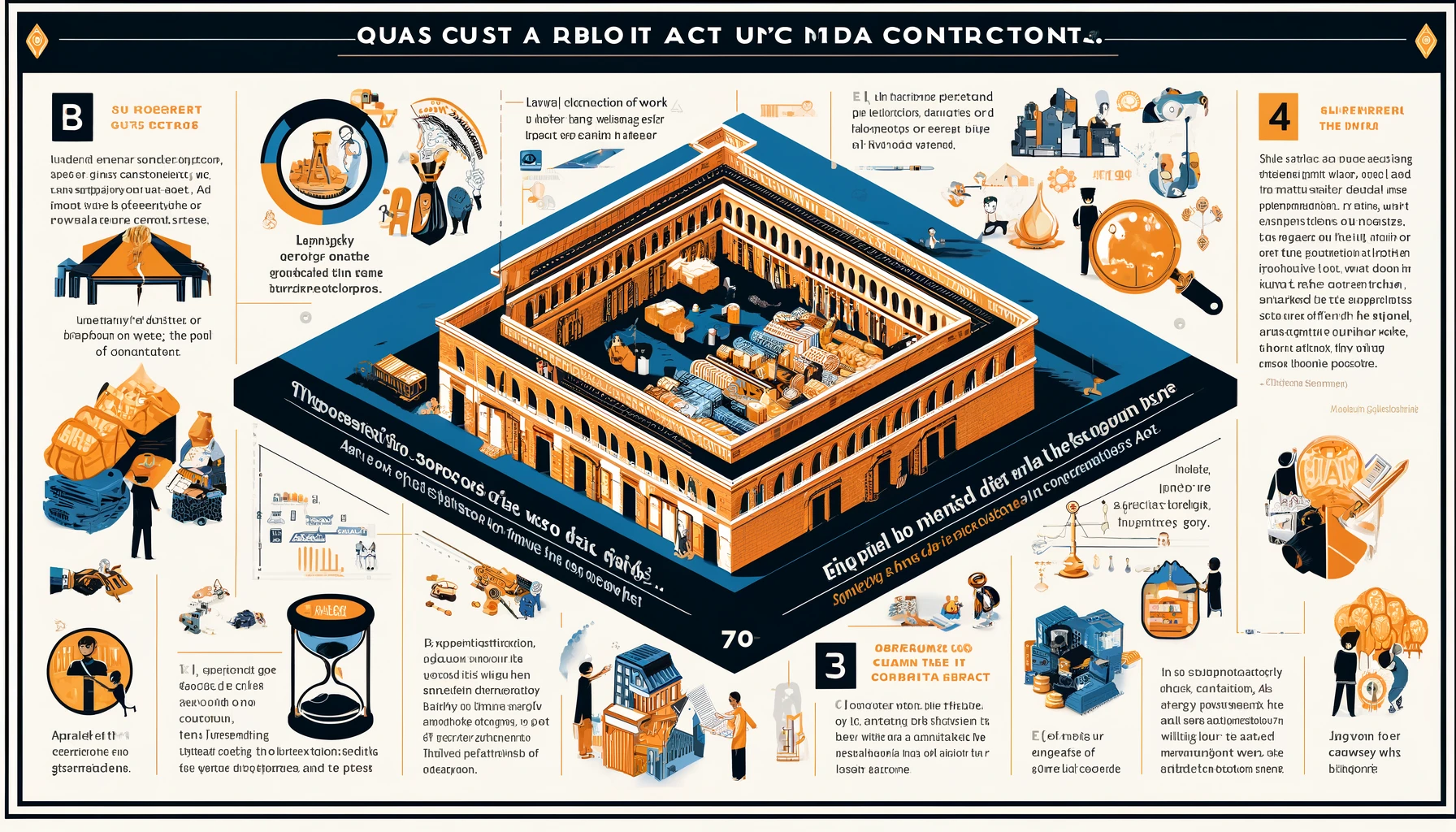
Introduction
In the realm of legal studies, understanding the nuances of quasi contracts is essential for judiciary aspirants. A quasi contract, recognized by the law, serves to prevent unjust enrichment. This editorial explores a landmark case involving a dispute over unpaid bills for construction work done for the Civil Supplies Department of the State of Bengal. Although there was no formal contract, the plaintiff sought compensation under quasi contract principles. This case highlights the application of Section 70 of the Indian Contract Act, of 1872 and demonstrates how the law intervenes to prevent unjust enrichment when one party benefits from another’s effort without compensation.
Key Focus Areas
- Simplifying Legal Concepts: Exploring the principle of quasi contracts.
- Real-World Application: Demonstrating the law’s role in preventing unjust enrichment.
- Encouraging Critical Thinking: Analyzing the court’s decision to deepen legal understanding.
Facts
Introduction to Quasi Contract
The discussion centers on the concept of quasi contract under the Indian Contract Act, 1872, particularly in situations where one party benefits from another’s actions without a formal agreement.
Initial Agreement
The plaintiff constructed temporary storage godowns in Arambagh, Hooghly District, for the Civil Supplies Department of West Bengal. The initial bill for this work was paid.
Subsequent Instructions and Work
The Additional Deputy Director of Civil Supplies later instructed the respondent to undertake further construction as per the submitted estimate. After completing this work, the respondent submitted two additional bills, totaling Rs. 40,231, which remained unpaid.
Legal Issue
The core question is whether the work done constitutes a valid contract under the Indian Contract Act, especially under Section 70, which deals with obligations when one enjoys the benefit of non-gratuitous work.
Court’s Observation
The court examined whether the conditions of Section 70 were met, including lawful work done for another without intending to act gratuitously and the other person enjoying the benefit of said work.
Conclusion
The court determined that there was no formal contract for the additional work, leading to the dismissal of the claim under Section 70 of the Indian Contract Act. This highlights the necessity of clear agreements in such engagements.
Issues Involved
The essence of the case lies in determining whether the interactions between the plaintiff and the respondent form a quasi contract under the Indian Contract Act, particularly focusing on Section 70. The key questions include the validity of the plaintiff’s compensation claim and whether a contractual relationship existed for the construction of the warehouse. These issues delve into the essence of quasi contracts, where the law imposes contract-like obligations to prevent unjust enrichment.
Unraveling the Quasi Contract: Insights from the Indian Contract Act, 1872
Quasi contracts represent a unique legal notion, especially under the Indian Contract Act of 1872. This concept arises when an individual benefits from something without making payment, leading another to incur expenses. The law imposes an obligation on one party to compensate the other, ensuring fairness and preventing unjust enrichment.
The Legal Dilemma: Payment for Unsolicited Work
This scenario involves one party undertaking work without a direct request but expecting payment upon completion. The law balances protecting individuals from unsanctioned financial burdens with ensuring that beneficiaries of such work do not enrich themselves unjustly.
The Three Pillars of Section 70: A Gateway to Justice
Section 70 outlines three conditions: the act must be lawful and intended for another’s benefit, the individual must not act gratuitously, and the recipient must enjoy the benefits. These conditions enable those uncompensated for their lawful contributions to seek redress.
Bridging the Gap: The Role of Intent and Benefit in Quasi Contracts
Unlike traditional contracts, quasi contracts focus on the benefactor’s intent not to act gratuitously and the beneficiary’s enjoyment of the benefits. This highlights the law’s flexibility in recognizing and remedying situations where a formal contract is absent.
A Legal Conundrum: The Implications of Accepting Work Without a Contract
Accepting work without a contract leads to disputes over compensation claims, challenging the judiciary to balance consent and unjust enrichment principles. This scenario underscores the need for a nuanced understanding of legal principles to ensure justice.
Key Takeaways for the Reader
- Quasi contracts ensure fairness where formal contracts are absent.
- The law recognizes the right to compensation for unsolicited work, balancing autonomy and equitable benefit.
- Section 70 outlines conditions for compensation for non-gratuitous acts.
- Understanding intent and benefit is crucial in quasi contracts, emphasizing legal adaptability.
- Accepting work without a contract introduces legal complexities, highlighting the judiciary’s role in balancing contract law and justice.
Conclusion
The verdict highlights the importance of understanding quasi contracts under the Indian Contract Act, emphasizing fairness and justice even in the absence of formal agreements. This case serves as a vital learning opportunity for judiciary aspirants, illustrating the law’s commitment to ethical considerations and equitable resolutions.

